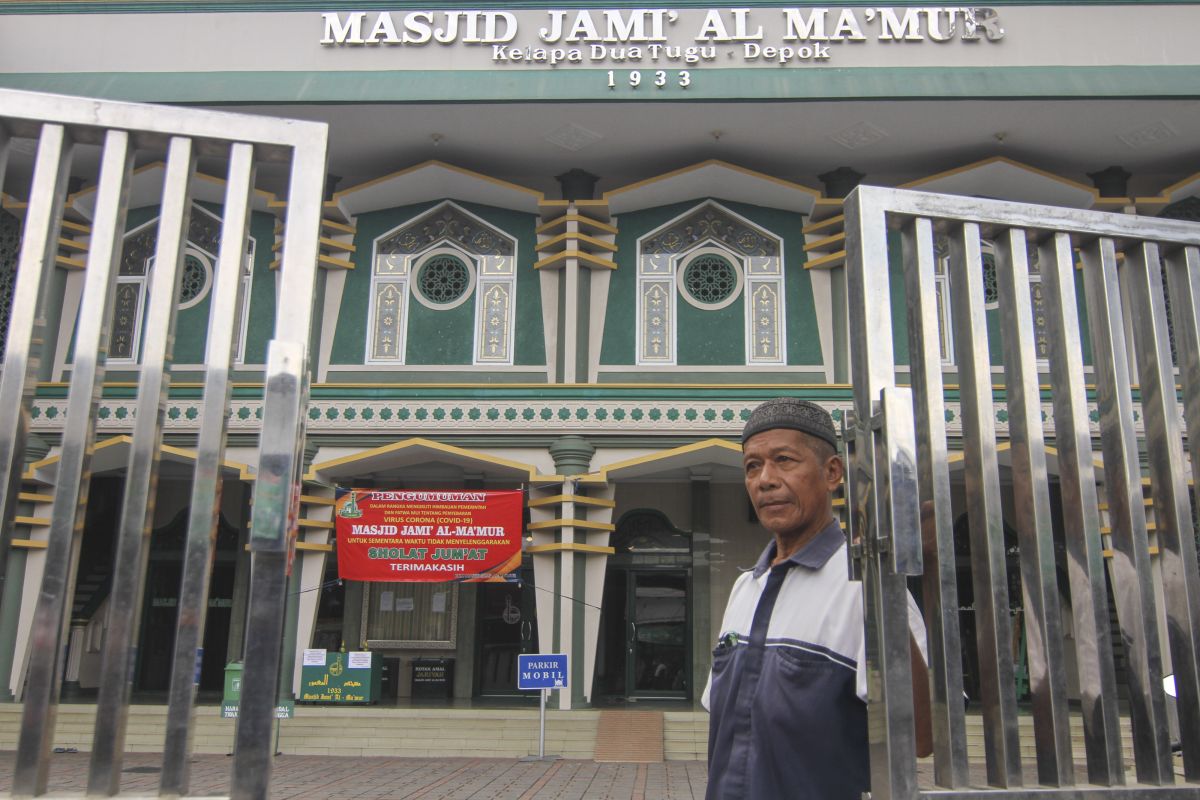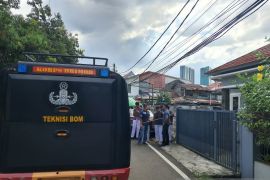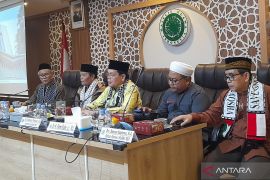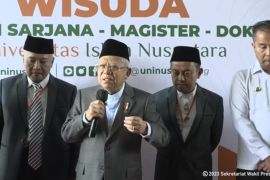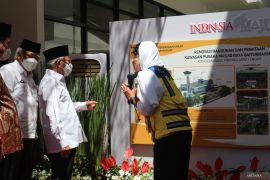Anything that can transmit COVID-19 in the community must be prevented and minimized,Jakarta (ANTARA) - Death toll from the coronavirus disease (COVID-19) in Indonesia has reached 181, as 11 others died in the past 24 hours, an official confirmed, Friday.
Some 22 others recovered, with those recovering totaling 134, while government spokesman for handling COVID-19, Achmad Yurianto, pegged the total confirmed COVID-19 cases at 1,986.
Nine others recovered, bringing the total to 112, while 1,671 are still under treatment.
These figures indicate that transmission is still ongoing outside. Hence, the government and Indonesian Ulema Council (MUI) have advised Muslims to worship at home.
The DKI Jakarta Provincial Government urged mosques there to not hold Friday prayers to prevent transmission of the new type of coronavirus causing COVID-19.
MUI edict commission chair Hasanuddin A. F. said with COVID-19 cases burgeoning and posing a life-threatening scenario, Muslims may not hold Friday prayers in the area until normalcy is restored and instead offer midday prayers at their respective places.
People should maintain health and avoid scenarios of exposure to disease since it involves following the main goal of religion, Hasanuddin said based on fatwa on worship during the COVID-19 pandemic.
Hasanuddin cautioned that people exposed to COVID-19 must self-isolate to prevent transmission. COVID-19 positive people can perform midday prayers at home, as Friday prayers is a compulsory worship involving mass gathering that increases viral transmission.
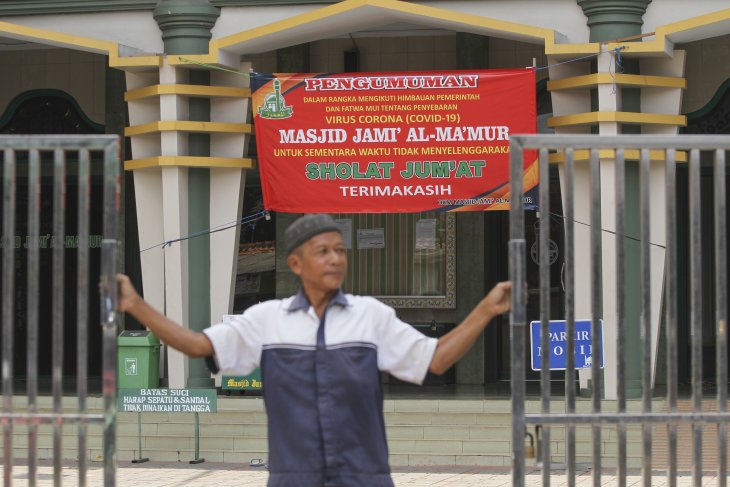
Infected people are banned from conducting sunnah worship that can spread the contagion: five daily prayers of dawn, mid-day, afternoon, sunset, and evening in congregation; Tarawih, night prayer during Ramadan; and Eid prayers at mosques or public places, and attending public recitals and great sermons, Hasanuddin remarked.
Healthy people and/or those whose health condition is yet unconfirmed or believed not to be exposed to COVID-19 must perform Zuhr at home and not partake in five daily prayers in congregation, Tarawih, and Eid prayers at the mosque or other public places, based on a fatwa if they are in an area with potential for transmission being high or very high based on the authorities’ provisions.
Muslims must hold Friday prayers once COVID-19 spread is halted, he stated.
Hasanuddin urged Muslims to obey the fatwa to help the government prevent COVID-19 transmission.
Istiqlal Mosque’s High Priest KH Prof. Nasaruddin Umar urged Muslims, especially in the COVID-19 contagion area, to temporarily no perform congregational activities to avoid transmission.
In COVID-19-endemic areas, sufficient rationale exists based on MUI’s recommendation to not hold meetings in congregation, including Friday prayers and five daily prayers.
Umar highlighted Prophet Muhammad’s advice on worship guidelines during disasters, which is to pray at home during a virus outbreak, flood or torrential rain.
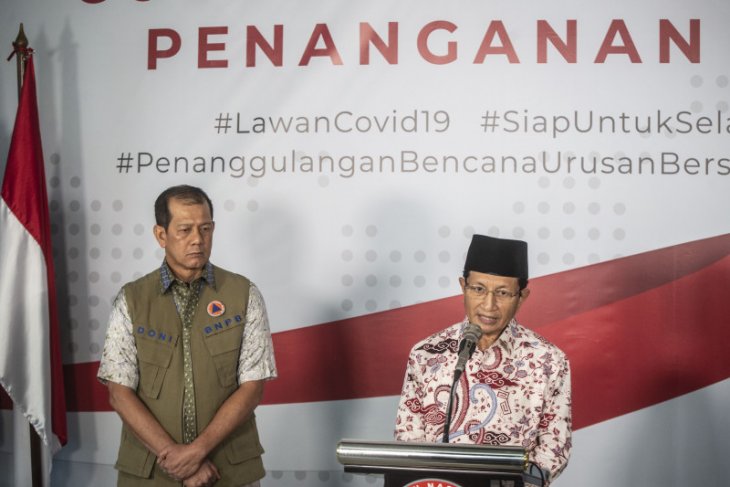
He remarked that Friday prayers could not performed in the current situation, so he invited Muslims to surrender to Almighty God, Allah.
“We are all in love with our religion, but the Qur'an also instructs to not throw ourselves into destruction. If you already know of great danger somewhere, we are urged to avoid it,” Umar said.
Fasting, Tarawih
MUI edict commission secretary Asrorun Niam Soleh believes worship rituals should be followed though being vigilant of the potential spread of COVID-19.
He said all parties and not just one community or the government should shoulder the responsibility of preventing the wider spread of COVID-19.
"Anything that can transmit COVID-19 in the community must be prevented and minimized," he emphasized.
In red zones or having a high transmission likelihood, people are encouraged to limit worship activities to places free of crowding and physical contact to stall further COVID-19 transmission.
Residents of green zone, or areas with low potential of viral transmission, can worship as usual, though avoiding congregations.
They are advised to maintain health and hygiene by routinely washing hands, cleaning places of worship, carrying personal prayer mats, and minimizing physical contact with others to lower viral spread.
"This is part of the endeavors, and we will strengthen it with prayers, and all Muslims must follow suit," he affirmed.
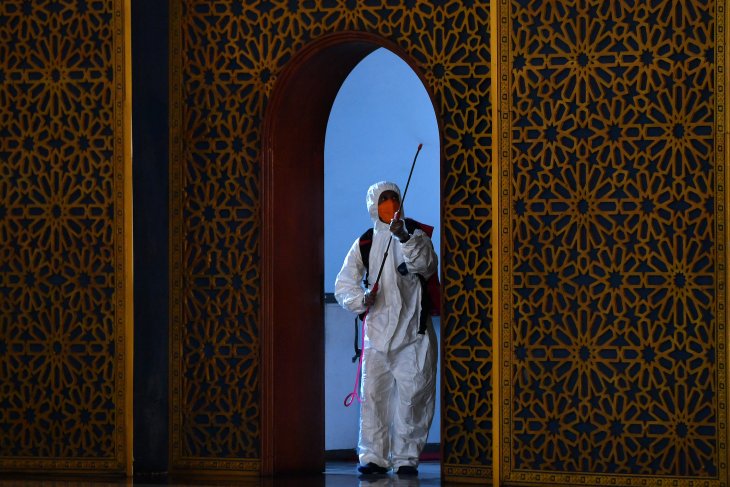
If COVID-19 transmission subsided, congregational prayers can be held again at mosques by following standards to prevent COVID-19 transmission.
MUI’s suggestion, also supported by religious leaders and Muslim organizations, involved replacing Friday Prayers with midday prayer, performing Tarawih at home, and abolishing religious activities that attract throngs of devout as crucial to fight COVID-19 transmission.
The recommendation also complied with President Joko Widodo's instruction to Indonesians to practice social distancing, or physical distancing, by working, studying, and worshipping at home to control COVID-19 transmission.
Despite individual differences, the MUI's fatwa guides Muslims in worshipping during the coronavirus outbreak.
While the door of the mosque is closed, the door of the grace of Allah is always open to His servants.
The door of the mercy of Allah SWT is never closed, as long as each servant worships properly and expects His protection.
With this belief, Muslims should willingly follow MUI's fatwa.
EDITED BY INE
Related news: Scientists discover anti-parasite drug Ivermectin kills SARS CoV-2
Related news: Chamber provide 100,000 rapid test kits to DKI Jakarta Government
Editor: Fardah Assegaf
Copyright © ANTARA 2020
